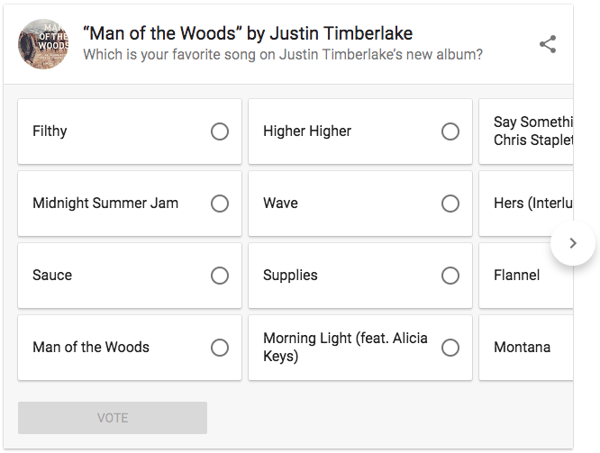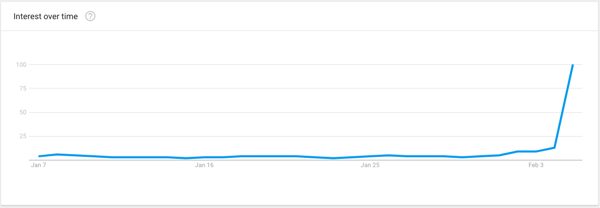I don't know about you, but when I hear the name "Justin Timberlake," I instinctively roll my eyes.
And while that sentiment may have caused 90% of you to bounce from this page, please, hear me out: This post is about Google more than it is about him.
It all started when my colleague, HubSpot's Director of Acquisition Matt Barby, pointed out that a Google search for Justin Timberlake would display the following within the search engine results page (SERP):

Naturally, I had questions. First, why isn't "none of them" an option? But more important -- what is Google up to? Why is the search engine polling searchers on their favorite new Justin Timberlake songs?
The answer: Data.
What are Google and Justin Timberlake Up To?
Google Wants in on the Data Game
My colleague Kevin Raheja, HubSpot's director of strategic partnerships, was one of the first to chime in when I began asking questions.
"Think about all the data Facebook has on users," he told me. "Google is trying to make a play at some of that consumer data."
Have a look at the search volume for Timberlake's name over the past 30 days:

Source: Google Trends
If Google does want to begin experimenting with data collection on consumer preferences -- in the same way, to Raheja's point, Facebook has gradually done since its inception -- it makes sense to do so by leveraging a high-volume, timely search query. Timberlake is already a rather popular figure, and his name is currently a trending search topic (love it or hate it, people are still talking about his Super Bowl LII halftime show).
But What Data Is Google Trying to Collect, and Why?
There are many reasons why someone might be searching for "Justin Timberlake" in the first place -- to learn about tour dates, find videos, re-watch his halftime show performances, or to reminisce about his previous hairstyle choices.
But if you're searching for Justin Timberlake, chances are, it's because you have an interest in something about him.
That search query alone already tells Google something about your preferences as a consumer -- especially if you use Chrome as your preferred browser and are signed into it through your Google account, which can connect your search history to your Google profile.
If that's the case, Google now knows that you're interested in Justin Timberlake -- and if you engage with new interactive SERP features like the favorite track poll we discovered today, that tells Google even more about your consumer preferences, like the fact that you even have a favorite track from his new album at all.
"I didn't vote because I only liked one album he did back when I was in college, and think he's good on 'Saturday Night Live'," explains Raheja, to illustrate his own level of engagement with this SERP content. "But I imagine most people who vote are fans. Knowing which Google users are, in fact, Justin Timberlake fans can theoretically help Google deliver more personalized ads, based on that consumer preference data."
(Too bad there wasn't an option for "none" -- I can only begin to imagine what that would tell Google about my own preferences.)
So, Is Google in Cahoots With Justin Timberlake?
I had to ask: Is this something on which Google collaborated with Timberlake's team? Could it simply boil down to little more than a publicity stunt?
"I doubt it," Raheja told me. "My guess is that it's not sponsored and that there's an intent to collect data," based on a search query that's already trending.
However, it is possible -- likely, even -- that we'll see more interactive SERP content like this from Google in the future, including some that's sponsored.
That could be something that Google is test-driving with this Justin Timberlake poll, to see if there's potential for sponsored polls from artists and businesses.
But first, Google has to scale these consumer polls, says Raheja -- which are, at least in these early stages, "designed to be engaging and collect data for Google."
Google isn't necessarily the only beneficiary, however. Consumers potentially have something to gain from this kind of feature.
"For a consumer, it seems fun and innocent to tell Google what your favorite Justin Timberlake song is," Raheja explains. "Once they warm up to that idea a bit more, I could see consumers voting on things that deliver feedback to businesses or advertisers."
Even in that case, though, consumers would be submitting some level of data as a byproduct of participating in such polls -- and allowing advertisers to gain information on their preferences, or segment them into audience categories.
Google has yet to comment on the feature.
As always, feel free to weigh in with thoughts or questions on Twitter.
No comments:
Post a Comment